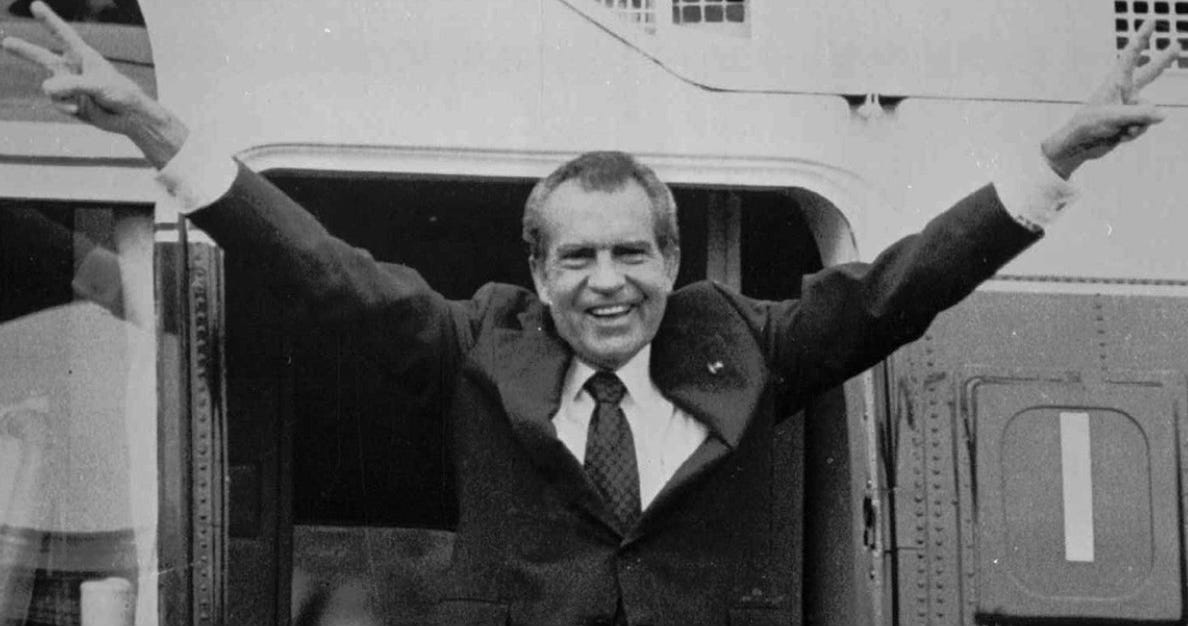
Even members of his own Republican Party wanted President Richard Nixon gone.
He had ordered the break-in at the Democratic Party’s headquarters in the Watergate building.
He and his co-conspirators had conducted a long, long coverup of the Watergate scandal’s various crimes.
He had ordered the CIA and FBI to block a growing movement to investigate the president..
That’s the bare bones of a scandal that forced Nixon to resign. That came after the noose was tightening and his crimes (e.g. obstruction of justice) no longer could be hidden.
The issues involving Biden and Nixon are different. Yet, what the two have in common is a public, bi-partisan furor to get him booted out of the Oval Office. Let us return to the thrilling days, weeks and months of the Nixon scandal. For people who are too young to remember this historic and long-running political battle to the death, they would benefit from and I think enjoy reading the fine books about the scandal.
I was a young reporter for the Chicago Daily News as the epic story unfolded, piece by piece. Every morning as I rode the train into the office I eagerly opened the Chicago Sun-Times. which carried the Washington Post investigation. Each day seemingly brought a new revelation that step by step sealed Nixon’s fate.
Holy smoke! After his repeated denials that he had nothing to do with it, came the stunning revelation: his White House conversations were taped—by Nixon himself. The tapes were subpoenaed. The Supreme Court ruled that they to be publicly disclosed. Turned out that 18 minutes of the tapes had been mysteriously had been erased. Nixon laughably tried to persuade everyone that his secretary, Rose Mary Woods, had accidentally erased 18 minutes while awkward learning back in her chair. (Incidentally, her brother, Joseph I. Woods, was a Cook County sheriff in Chicago.)
House and Senate committees were convened. Nixon’s orders to the FBI and the CIA not to investigate were leaked. As the evidence mounted, the calls for his impeachment were sounded from both political parties. It was a Republican senator, Howard Baker of Tennessee, who first uttered the words now etched in history: “What did the President know and when did he know it?”
The House Judiciary Committee approved three articles of impeachment Nixon was losing it, reportedly talking to White House portraits of previous presidents. Respected Republican elders visited him and told him point blank that he would be impeached and the Senate would likely convict. They must have been mightily persuasive. He resigned.
Looking back, watching all of this unfold, even from the sidelines, was as exciting as it was dreadful and frightening. I was proud to be a member of the journalism profession that uncovered one of the worst betrayals in our history.
No more am I proud. Somehow the journalistic successes were corrupted by that today’s dogma that a reporter’s job was to “tell the truth”—as he sees it. Objectivity is out the window. Hence the years of the press’ denial of the obvious truth the President Joe Biden has been declining, and dangerously so.
The media are trying to hide their own sin of omission by accusing the White House of covering up the decline—when the decline has been apparent to nearly everyone.
America entered a period of mistrust that took years of recovery. We’ve entered another period of mistrust that rivals the 1970s. Thanks goes to both sides of the political spectrum, most particularly to whoever is using Biden to secure their own radical, progressive agenda.
We’re heading to a climax, I fear, that could overshadow the Watergate trauma. Perhaps the only way out is for courageous and honest Democratic elders to take charge, confront Biden, and lead America to a soft landing.
Just like Republicans did during Watergate.



